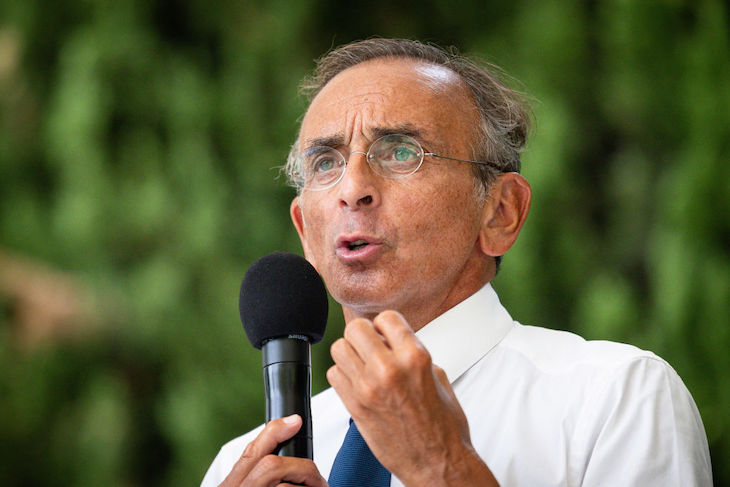Eric Zemmour will be in London on 13 September at the invitation of Tommy Robinson. In a message posted on X, the leader of France’s Reconquest Party said he will ‘stand alongside the hundreds of thousands of Britons demonstrating against the submergence of our countries.’
Zemmour is an advocate of the ‘Great Replacement’ theory
Robinson is the organiser of what is being billed as a ‘Free Speech Festival’ in central London. It aims to bring together three movements: UTK (Unite the Kingdom), MEGA (Make Europe Great Again) and MAGA (Make America Great Again).
Various left-wing groups, among them Socialist Worker and Stand Up to Racism, are encouraging their members to congregate in the capital on the same day for a counter-demonstration.
The presence of Zemmour has already drawn ire from the British branch of France’s Green party. In a message posted on their website they ‘strongly’ condemned his invitation to attend the march. They recalled that when Zemmour came to London in November 2021, his visit was criticised by mayor Sadiq Khan, who declared that ‘nobody who wants to divide our communities or incites hatred against people because of the colour of their skin or the god they worship is welcome in our city’.
Khan wasn’t the only person who objected to the presence of Zemmour. The Spectator’s Freddy Gray, who interviewed the Frenchman for the magazine, wrote: ‘The British Establishment has given him a cold reception. Mayor Sadiq Khan said he wasn’t welcome. The Royal Institution cancelled his event. The government ordered Conservatives to call off meetings with him.’
At the time of his visit, Zemmour had just launched his 2022 presidential campaign and he was riding high in French polls. The British Establishment might not have appreciated his presence but they would never have dared ban him.
Four years later, however, and Zemmour’s star has waned. His presidential campaign fizzled out, as have his hopes of establishing Reconquest as a major political party. In last year’s snap parliamentary election they polled 238,934 ballots, 0.75 per cent of the total votes cast.
Nonetheless Zemmour and his solitary MEP, Sarah Knafo, retain a significant intellectual presence in French politics. They are frequently in the media. The pair were the only politicians in France to receive an official invitation to Donald Trump’s inauguration at the start of this year.
Zemmour is an advocate of the ‘Great Replacement’ theory, the belief propagated by the French writer Renaud Camus that ethnic white European populations are being replaced by non-white people. As Le Monde remarked in November 2021, Zemmour ‘dreams of making it the central issue of the 2022 presidential election’.
Zemmour and Camus have something else in common: they have been convicted and fined for hate speech by French courts. Camus was found guilty in 2014 for stigmatising Muslims as ‘thugs, soldiers, the armed wing of conquest’. Zemmour has several convictions, including a €10,000 (£8,350) fine in 2022 for describing unaccompanied migrant minors as ‘rapists’ and ‘murderers’.
In April this year Renaud Camus was invited to speak at the Oxford Union and a conference organised by the Homeland Party. The British government barred him from entering the country on the grounds his presence was ‘not considered conducive to the public interest.’
A month after the government banned Camus from entering the country, the French far-left MP Daniele Obono was invited to London to speak at an event organised by the British branch of France’s Green party, the same organisation that rails against Zemmour.
In October 2023, ten days after Hamas terrorists had massacred 1,200 Israeli men, women and children, Obono described the Palestine terror group as a ‘resistance movement’, a declaration that prompted Gérald Darmanin, then Interior Minister, to file a complaint, but no charges were brought.
In 2022, Obono was criticised by some on the French left for meeting Jeremy Corbyn during his visit to Paris. Corinne Narassiguin, a senior figure in the Socialist party, said that welcoming a man ‘who was expelled from the British Labour Party’s parliamentary group for laxity in the face of anti-Semitism’ was not part of the left’s ‘common values’.
Another controversial French far-left MP, Raphael Arnault, came to London last August to participate in pro-migrant demonstrations. On a police watchlist because of his alleged radicalism, Arnault has a conviction for violence and is a co-founder of an extreme-left group, The Young Guard, which this year was proscribed by Bruno Retailleau, France’s Interior Minister, for ‘inciting violent acts against individuals’.
If Arnault and Obono are allowed to visit Britain, then so should Zemmour. All are politicians, but then so is Geert Wilders, and in 2009 the Labour government refused him entry. Jacqui Smith, the Home Secretary at the time, said that the Dutchman’s presence ‘would threaten community harmony and therefore public safety in the UK’.
Wilders’ Freedom Party was topping Dutch opinion polls in 2009, but his popularity made no difference to Labour. They took offence to his opinion of Islam and banned him. ‘Even if you don’t like me and don’t like the things I say then you should let me in for freedom of speech,’ retorted Wilders. ‘If you don’t, you are looking like cowards.’
Were Zemmour to be refused entry to Britain, Keir Starmer’s government wouldn’t just look like cowards. They would also be hypocrites, running a two-tier exclusion policy which embraces figures from the far-left but banishes those from the far-right.








Comments